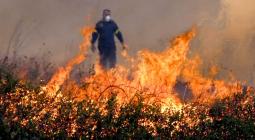Imminent Spike of Planetary Warming and Deepens Divides Among Climate Scientists - New Study Warns

James Hansen, the scientist who first sounded the climate alarm in Congress, sees a decrease in aerosol pollution driving a surge of warming and criticizes the U.N. climate science panel, drawing a backlash from other researchers.
During the past year, the needles on the climate dashboard for global ice melt, heatwaves, ocean temperatures, coral die-offs, floods and droughts all tilted far into the red warning zone. In summer and fall, monthly global temperature anomalies spiked beyond most projections, helping to drive those extremes, and they may not level off anytime soon, said James Hansen, lead author of a study published today in the journal Oxford Open Climate Change that projects a big jump in the rate of warming in the next few decades.
But the research was controversial even before it was published, and it may widen the rifts in the climate science community and in the broader public conversation about the severity and imminence of climate impacts, with Hansen criticizing the United Nations Intergovernmental Panel on Climate Change for underestimating future warming, while other researchers, including IPCC authors, lambasted the new study.
The research suggests that an ongoing reduction of sulfuric air pollution particles called aerosols could send the global average annual temperature soaring beyond the targets of the Paris climate agreement much sooner than expected, which would sharply increase the challenges faced by countries working to limit harmful climate change under international agreements on an already treacherous geopolitical stage.
PHOTO: Climate scientist and activist James Hansen attends a press conference at the COP 23 United Nations Climate Change Conference on November 6, 2017 in Bonn, Germany. Credit: Sean Gallup/Getty Images





